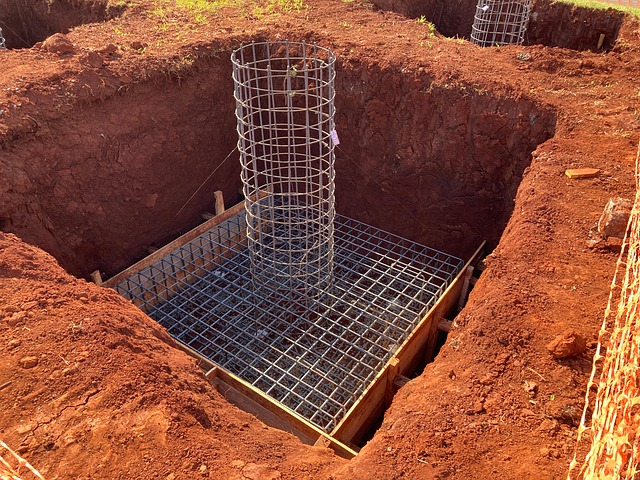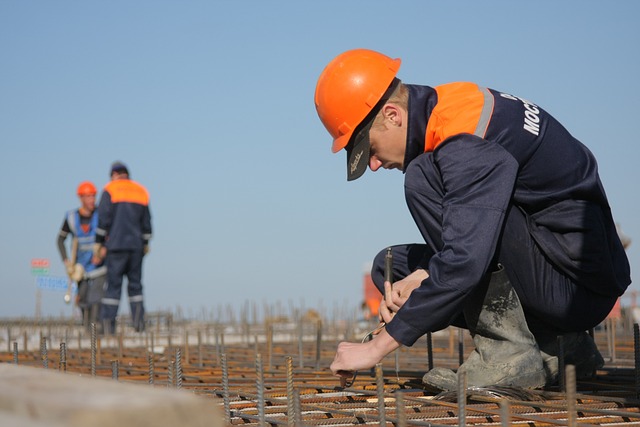Basement leaks signal deeper structural issues, primarily caused by soil settlement or outdated seals in humid areas. Prompt identification and repair by Foundation Contractors are crucial to prevent severe damage. Assess damage, pinpoint origins, and opt for strategic solutions: temporary fixes or long-term structural repairs. Advanced technology helps contractors locate and address leaks effectively using tools like moisture meters and radar. Moisture barriers and waterproofing techniques protect against future leaks. Post-leak, immediate action includes source repair and drying to prevent mold; follow with structural damage assessments and waterproofing advice from Foundation Contractors. Regular maintenance through inspections, sump pumps, and sealing gaps prevents leaks and prolongs home life.
Basement leaks are a common household dilemma, often leading to significant damage and costly repairs. Understanding the root causes, such as cracked foundations or inadequate waterproofing, is key to effective prevention. Knowing when to enlist the help of foundation contractors can make all the difference in mitigating water intrusion. This article guides you through every step—from identifying leak sources to long-term solutions like advanced technology and moisture barriers—offering practical tips for restoring and maintaining your basement’s integrity with expert intervention from foundation contractors.
Understanding Basement Leaks: Common Causes and Entry Points

Basement leaks are a common problem that can arise from various sources, often indicating underlying issues with your home’s foundation or structural integrity. Understanding the common causes and entry points of basement leaks is crucial when considering repair options. One of the primary culprits is settling or shifting soil around the foundation, which can create cracks in the walls and floors, allowing water to seep in. These cracks can be caused by poor initial construction, settlement of the soil due to weight or moisture changes, or even tree roots exerting pressure on the foundation.
Other common entry points include outdated or damaged sealing materials around windows and doors, as well as pipes and vents running through the basement walls. Over time, these seals can degrade, especially in areas with high humidity or extreme weather conditions. Foundation contractors often recommend regular inspections to identify these issues early on, as prompt repair can prevent more severe and costly damage down the line.
When to Call Foundation Contractors for Leak Repair

If you’re noticing water seeping into your basement from cracks in the walls or floor, it’s time to take action. While small leaks can sometimes be temporarily fixed with DIY methods, persistent or widening cracks are signs of a more serious issue. That’s where Foundation Contractors come in. They possess the expertise and equipment needed to accurately diagnose the problem—whether it’s faulty plumbing, settling soil, or a structural defect—and provide effective solutions.
Don’t delay when you observe these red flags. Timely intervention can prevent further damage to your home’s foundation and structure. Contacting Foundation Contractors early on ensures a proper assessment and allows for the implementation of long-lasting repairs that will safeguard your basement from future leaks.
Assessing the Damage: Identifying the Source of the Leak

When dealing with a basement leak, assessing the damage and identifying its source is crucial before attempting any repair. Start by inspecting the affected area for visible signs like water stains, mold growth, or bubbling paint. These indicators can point to the type and severity of the issue. Check for common leak sources such as cracked pipes, faulty appliances, or issues with the foundation itself. Foundation contractors often encounter leaks stemming from settlement cracks, bowing walls, or improper drainage systems.
Use a flashlight to examine hard-to-reach areas and look for any signs of moisture or water accumulation. If the leak is coming from the exterior, inspect the roof, gutters, and downspouts for blockages or damage that could lead to overflow. For interior leaks, trace the path of water to its origin, which might be a broken washing machine hose, an old pipe joint, or a faulty window well. Identifying the source is key to effective leak repair and preventing future issues.
Temporary Solutions vs. Long-Term Repairs for Basement Leaks

When dealing with basement leaks, homeowners often face a choice between temporary fixes and long-term solutions. Temporary solutions like placing buckets to catch water or using plastic sheeting can provide an immediate stopgap measure, preventing further damage until a more permanent repair can be scheduled. However, these quick fixes are not designed to address the root cause of the leak and may only offer a short-lived solution.
Long-term repairs, on the other hand, involve addressing structural issues that lead to leaks. This might include repairing or replacing cracked foundations, installing waterproofing membranes, or even reinforcing the entire basement structure. While these solutions require more time and investment upfront, they ensure a durable fix that protects homes from future water intrusion. Foundation contractors are specialists equipped to provide these long-term repairs, offering peace of mind for homeowners concerned about persistent basement leaks.
Advanced Technology in Basement Leak Detection and Repair

In today’s digital era, advanced technology has revolutionized basement leak detection and repair, making it more efficient and accurate than ever before. Foundation contractors now employ sophisticated tools such as moisture meters, thermal imaging cameras, and ground-penetrating radar to identify leaks and assess damage non-invasively. These technologies enable them to pinpoint the exact source of the problem, whether it’s a cracked pipe, faulty sealant, or structural issues within the foundation.
By utilizing these advanced methods, contractors can offer targeted solutions tailored to each unique situation. This not only enhances the effectiveness of leak repair but also helps in preventing future issues. With precision and speed, they can restore your basement to its dry, comfortable state, ensuring your peace of mind and the longevity of your home’s structure.
The Role of Moisture Barriers and Waterproofing in Prevention

Moisture barriers and waterproofing play a pivotal role in preventing basement leaks, acts as a protective shield for your home’s foundation. These solutions are crucial for blocking water intrusion, which is often the root cause of basement flooding and subsequent damage. Foundation contractors use advanced materials to create seamless barriers between the interior and exterior environments, ensuring that any moisture attempting to enter is redirected or contained.
Waterproofing goes beyond simple barrier installation. It involves addressing potential entry points, sealing cracks, and ensuring proper drainage around the foundation. By implementing these measures, homeowners can significantly reduce the risk of costly repairs and mitigate the constant threat of water damage. Effective waterproofing is a long-term investment that safeguards not just the basement but also the entire structural integrity of your home, as recommended by leading foundation contractors.
Restoring Your Basement After a Leak: Tips and Best Practices

After a basement leak, restoration is essential for both structural integrity and comfort. The first step is to address the source of the leak. This might involve repairing or replacing damaged pipes, fixing cracked walls, or sealing entry points for water. Once the leak is under control, it’s time to start the restoration process. Begin by removing any water-damaged items and drying out the space thoroughly. Consider using fans, dehumidifiers, or even professional extraction services to ensure complete dryness.
Next, assess the extent of mold growth, if any. Mold can be a serious issue and may require professional intervention. If present, address it promptly with appropriate cleaning solutions and containment methods. Once dry, inspect your basement for structural damage and consider reaching out to foundation contractors for expert advice on repairs. They can help ensure that your basement is not only structurally sound but also waterproofed effectively to prevent future leaks.
Maintenance Tips to Prevent Future Basement Leaks

Regular maintenance is key to preventing basement leaks and ensuring your home’s longevity. One of the first steps is to inspect your basement for any signs of moisture or water damage, especially around pipes, windows, and doors. Addressing these issues early can save you from costly repairs down the line.
To further safeguard your basement, consider investing in a sump pump to remove excess water and maintain proper drainage. Additionally, keep an eye on your home’s foundation for any cracks or unevenness, as these could indicate structural problems that may lead to leaks. Regularly sealing gaps around windows and doors is another effective measure, along with ensuring proper ventilation to reduce humidity levels, which can contribute to mold growth and leak-prone conditions. Don’t hesitate to reach out to professional foundation contractors for expert advice and solutions tailored to your home’s unique needs.
